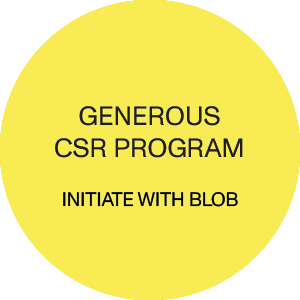Generous corporate social responsibility (CSR) program reflects a company’s commitment to making a positive impact on society.
It involves philanthropic initiatives, community engagement and environmentally responsible practices.
Generous CSR program goes beyond compliance, demonstrating a sincere dedication to social and environmental well-being, fostering goodwill and contributing to the broader betterment of communities.
Personalized Progress Disclaimer. Embarking on a journey to enhance your professional presence can feel like a significant undertaking. We want to assure you that our approach is tailored to your pace, ensuring a smooth and comfortable experience. Our collaborative process begins with an exploration of your goals, and together, we navigate the learning curve at a speed that suits you. Your progress is the compass, and we are here to guide you, ensuring a relaxed and uplifting journey. You can trust that every step is orchestrated to align with your comfort, ensuring a positive and manageable path towards achieving your business aspirations.

A generous corporate social responsibility (CSR) program reflects a company’s commitment to making a positive impact on society.
It involves philanthropic initiatives, community engagement and environmentally responsible practices.
A generous CSR program goes beyond compliance, demonstrating a sincere dedication to social and environmental well-being, fostering goodwill and contributing to the broader betterment of communities.
By taking these actions, we can assist a client in launching a generous CSR program that reflects their commitment to social responsibility, engages stakeholders effectively and contributes to meaningful and sustainable positive change:
- CSR Strategy Development: collaborating with the client to develop a comprehensive CSR strategy aligned with their values, business objectives and stakeholder expectations
- Stakeholder Engagement: identifying and engaging with key stakeholders, including employees, customers and community members, to understand their needs and preferences. Incorporating stakeholder input into the CSR program
- Needs Assessment: conducting a thorough needs assessment to identify pressing social or environmental issues within the community or industry. This assessment informs the selection of CSR initiatives
- Impact Measurement Framework: developing a framework for measuring the impact of the CSR program. Defining key performance indicators (KPIs) and metrics to assess the program’s success and effectiveness
- Partnership Building: identifying potential partners, including non-profit organizations, NGOs or community groups, to collaborate with on CSR initiatives. Partnerships can enhance the program’s reach and impact
- Employee Involvement Programs: designing programs that encourage employee involvement in CSR activities. This can include volunteer opportunities, skills-based initiatives or employee-led community projects
- Communications Strategy: developing a comprehensive communications strategy to launch and promote the CSR program. Highlighting the client’s commitment to social responsibility and its positive impact on communities
- Transparency and Accountability: emphasizing transparency and accountability in CSR initiatives. Clearly communicating goals, progress and outcomes to stakeholders. Regularly reporting on the impact of the program
- Community Engagement Events: planning and organizing community engagement events to launch the CSR program. These events can include awareness campaigns, workshops or initiatives that directly involve the community
- Educational Initiatives: incorporating educational components into the CSR program. This can involve supporting educational institutions, providing scholarships or implementing educational campaigns
- Sustainability Programs: exploring sustainability initiatives that align with the client’s business operations. This could include reducing environmental impact, adopting eco-friendly practices or supporting conservation efforts
- Global CSR Standards Compliance: ensuring that the CSR program aligns with global CSR standards and best practices. Adherence to established guidelines enhances credibility and ensures ethical practices
- Employee Training on CSR: providing training to employees on the importance of CSR, the goals of the program and how they can actively contribute. Engaged employees are crucial to the success of CSR initiatives
- Philanthropy and Grants: considering philanthropic initiatives and grants to support non-profit organizations or community projects. This can provide direct financial support to causes aligned with the CSR program
- Diversity and Inclusion Programs: implementing diversity and inclusion initiatives within the CSR program. This could involve supporting underrepresented groups, promoting diversity in hiring and fostering inclusive workplace practices
- Technology for Social Impact: exploring the use of technology for social impact. This may include leveraging digital tools, apps or platforms to enhance the reach and efficiency of CSR initiatives
- Regular Program Evaluation: establishing a system for regular program evaluation. Conducting assessments to measure the program’s impact, gather feedback and make data-driven adjustments for continuous improvement
- CSR Reporting and Documentation: developing a structured CSR reporting and documentation process. Producing annual reports that showcase the program’s achievements, challenges and future goals
- Employee Recognition Programs: creating programs to recognize and celebrate employee contributions to CSR initiatives. Acknowledging and rewarding employee efforts can boost morale and engagement
- Long-Term Commitment: emphasizing the client’s long-term commitment to CSR. Highlighting that the program is not just a one-time initiative but a sustained effort to make a positive impact over the years

Pricing. Our pricing structure is designed with modularity in mind, ensuring that you only pay for the services you require, allowing for flexibility and customization. For each task you may decide to delegate to us there is a prewritten full-service list. This list consists of basic must do services, extent of available optional added services and suggestion of optional added third party services. During our task related Initial Chat, in a direct conversation with the client, we choose a customized list of services as per clients’ needs and circumstances. To accommodate different difficulty levels, we introduce an index for difficulty. The basic price is multiplied by this index to calculate the price for a task at any difficulty level, ensuring a fair and flexible pricing model that accurately reflects the complexity of the services provided. The level is argumented and agreed upon during the task related Initial Chat. With these inputs we then prepare and deliver to client our exact offer. For client’s information and potential budget range idea we have provided, for each task, a task price list as .pdf file with relevant details disclosed.

